冀教版八年级下Unit 5 Buying and Selling>Lesson 28 Ms. Liu's Great Idea课件(20张ppt)
文档属性
| 名称 | 冀教版八年级下Unit 5 Buying and Selling>Lesson 28 Ms. Liu's Great Idea课件(20张ppt) |
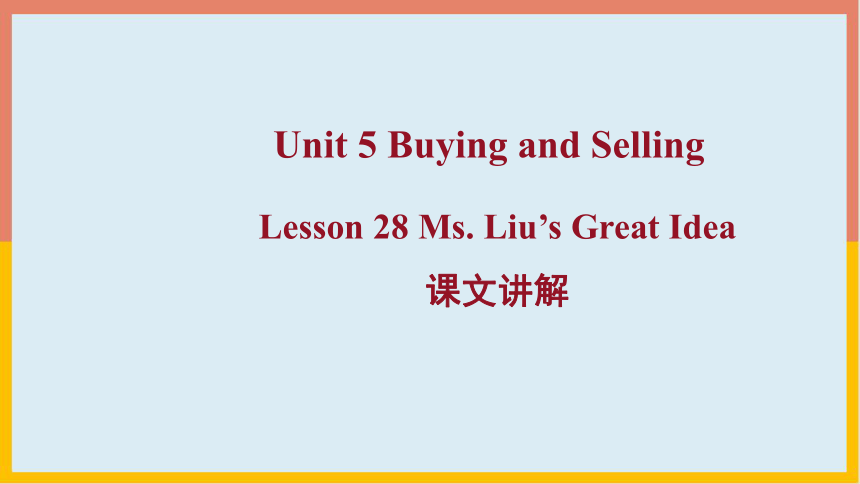
|
|
| 格式 | pptx | ||
| 文件大小 | 9.4MB | ||
| 资源类型 | 教案 | ||
| 版本资源 | 冀教版 | ||
| 科目 | 英语 | ||
| 更新时间 | 2022-01-03 17:48:25 | ||
图片预览

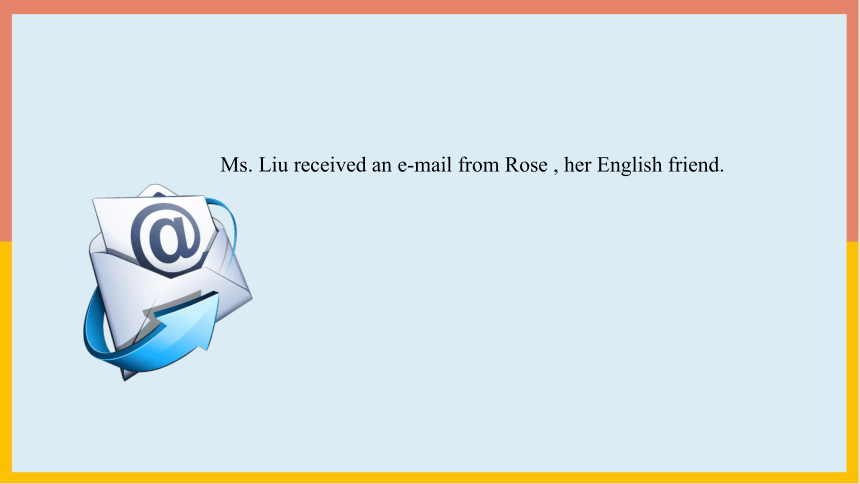
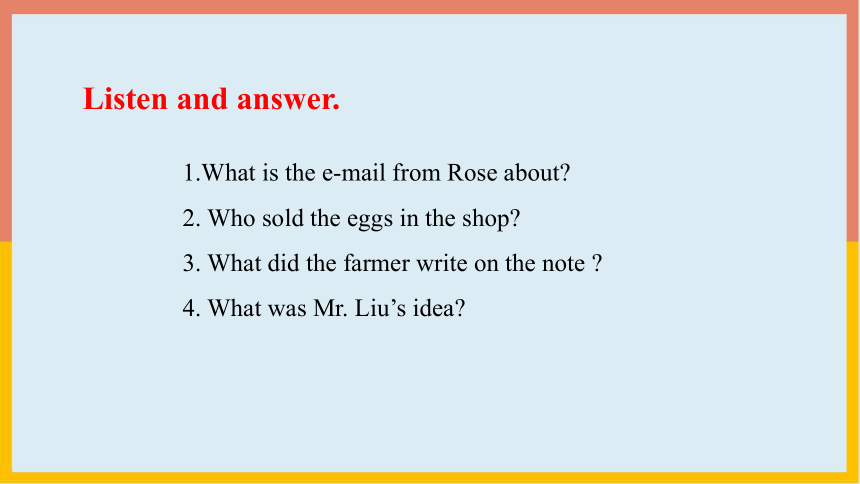


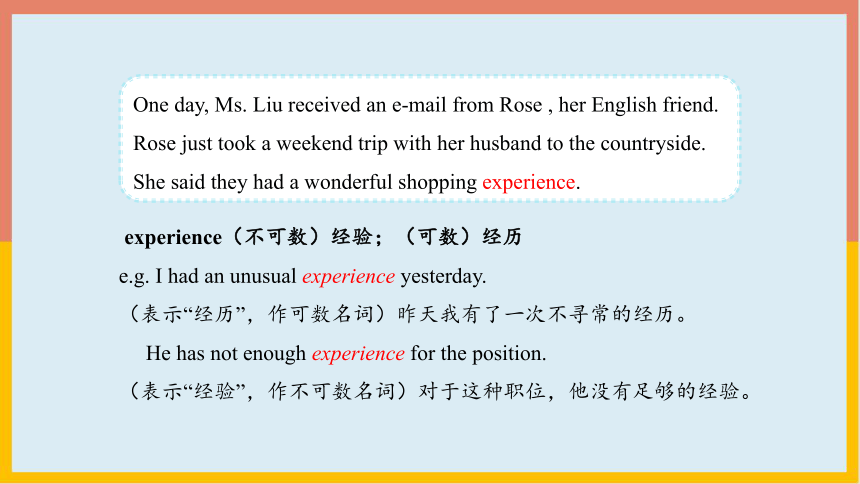
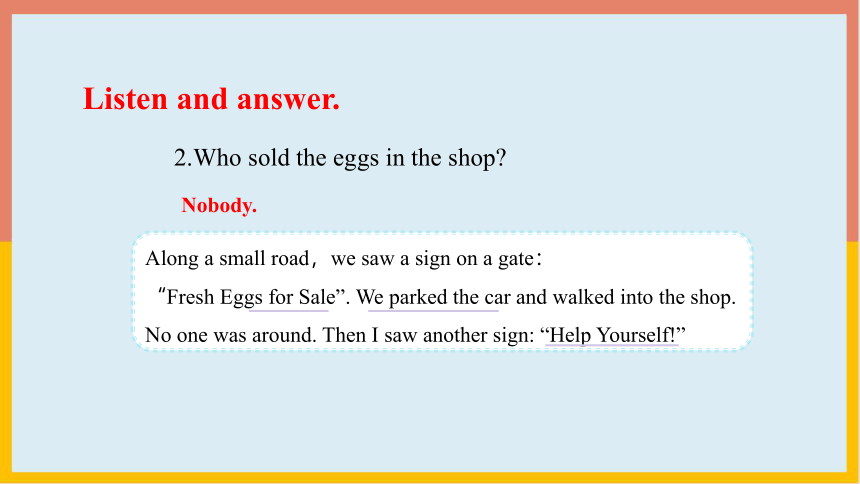
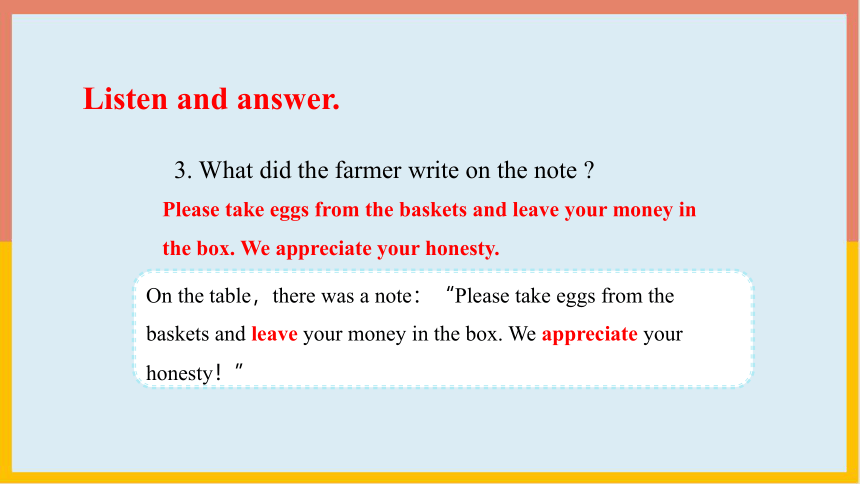
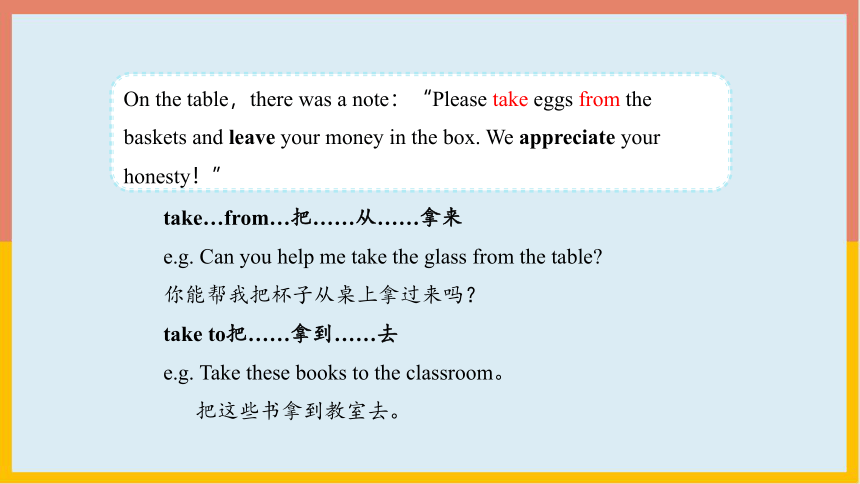
文档简介
(共20张PPT)
Lesson 28 Ms. Liu’s Great Idea
课文讲解
Unit 5 Buying and Selling
Ms. Liu received an e mail from Rose , her English friend.
1.What is the e-mail from Rose about
2. Who sold the eggs in the shop
3. What did the farmer write on the note
4. What was Mr. Liu’s idea
Listen and answer.
.
.
One day,Ms. Liu received an e mail from Rose,her English friend. Rose just took a weekend trip with her husband to the countryside. She said they had a wonderful shopping experience.
When Ms. Liu read this story,she smiled. She had an idea. She would help her students open this kind of shop at her school. Students could take things from the shop and leave money in a box. The shop would raise money for school activities.
It was a great idea!Ms. Liu believed that most people want to be honest. This shop would be a good way for students to learn the value of honesty. The perfect motto for this shop would be,“Take what you need. Give what you can. We trust you!”
原文呈现
Along a small road,we saw a sign on a gate:
“Fresh Eggs for Sale”. We parked the car and walked into the shop.
No one was around. Then I saw another sign:“Help Yourself!” On the table,
there was a note:“Please take eggs from the baskets and leave your money in the box. We appreciate your honesty!”We were surprised to find that the farmer was so trusting. I took my eggs and put some money in the box. On our way home,I wondered if everyone would be honest.
1.What is the e-mail from Rose about
Listen and answer.
It’s about a wonderful shopping experience of Rose and her husband.
One day, Ms. Liu received an e mail from Rose , her English friend. Rose just took a weekend trip with her husband to the countryside. She said they had a wonderful shopping experience.
take a trip去旅行
One day, Ms. Liu received an e mail from Rose , her English friend. Rose just took a weekend trip with her husband to the countryside. She said they had a wonderful shopping experience.
experience(不可数)经验;(可数)经历
e.g. I had an unusual experience yesterday.
(表示“经历”,作可数名词)昨天我有了一次不寻常的经历。
He has not enough experience for the position.
(表示“经验”,作不可数名词)对于这种职位,他没有足够的经验。
2.Who sold the eggs in the shop
Listen and answer.
Nobody.
Along a small road,we saw a sign on a gate:
“Fresh Eggs for Sale”. We parked the car and walked into the shop.
No one was around. Then I saw another sign: “Help Yourself!”
3. What did the farmer write on the note
Listen and answer.
Please take eggs from the baskets and leave your money in the box. We appreciate your honesty.
On the table,there was a note:“Please take eggs from the baskets and leave your money in the box. We appreciate your honesty!”
On the table,there was a note:“Please take eggs from the baskets and leave your money in the box. We appreciate your honesty!”
take…from…把……从……拿来
e.g. Can you help me take the glass from the table
你能帮我把杯子从桌上拿过来吗?
take to把……拿到……去
e.g. Take these books to the classroom。
把这些书拿到教室去。
On the table,there was a note:“Please take eggs from the baskets and leave your money in the box. We appreciate your honesty!”
leave v. 忘了带;丢下
leave+宾语+地点状语”表示“把……落在……”
e.g. When he got home, he found that he had left his English book at school.
当他到家的时候,他发现他把英语书忘在学校里了。
“
拓展
“忘记”,指忘记具体的东西,通常不能与表示地点的单词或短语连用。
forget
e.g.
Don’t forget the tickets and an umbrella.
别忘了票和雨伞。
On the table,there was a note:“Please take eggs from the baskets and leave your money in the box. We appreciate your honesty!”
appreciate v.
感激;感谢
名词
代词
动词的-ing
e.g. He appreciated their confidence.他感激他们的信任。
We shall appreciate hearing from you again.
如再次收到你的来信,我们将十分感激。
4. What was Mr. Liu’s idea
Listen and answer.
She would help her students open this kind of shop at her school.
When Ms. Liu read this story, she smiled. She had an idea. She would help her students open this kind of shop at her school. Students could take things from the shop and leave money in a box. The shop would raise money for school activities.
On our way home, I wondered if everyone would be honest.
3
在回家的路上,我想知道是否每个人都是诚实的。
honest adj.坦白的;诚实的
e.g. His father is an honest businessman.
他父亲是个诚实的商人。
dishonest adj. 不诚实的
honesty n. 诚实
honestly adv. 诚实地;正当地
拓展
This shop would be a good way for students to learn the value of honesty.
3
这家商店将是学生学习诚实的价值的一个好方法。
value n. 价值
valuable 有价值的
形容词
be of value =be valuable( 是) 有价值的
This book is of great value to me in my studies.
= This book is very valuable to me in my studies.
这本书对我的学习有很大的价值。
This shop would be a good way for students to learn the value of honesty.
3
这家商店将是学生学习诚实的价值的一个好方法。
value n. 价值
valuable 有价值的
形容词
be of no value =be not valuable(是) 没有价值的
This letter is of no value to her.
=This letter is not valuable to her.
这封信对她没有价值。
拓展
value v. 重视;珍惜
e.g. The Chinese highly value the family ties.
中国人高度重视家族关系。
We trust you!
3
我们相信你!
v. 相信;信任
多指相信某人,语气较重,表示深信不疑。
相信;认为。多指相信某人所说的话。
trust
believe
trust sb. =believe in sb.信任某人
Unit 5-Lesson 28课后作业(微课配套)
Bye-bye
Lesson 28 Ms. Liu’s Great Idea
课文讲解
Unit 5 Buying and Selling
Ms. Liu received an e mail from Rose , her English friend.
1.What is the e-mail from Rose about
2. Who sold the eggs in the shop
3. What did the farmer write on the note
4. What was Mr. Liu’s idea
Listen and answer.
.
.
One day,Ms. Liu received an e mail from Rose,her English friend. Rose just took a weekend trip with her husband to the countryside. She said they had a wonderful shopping experience.
When Ms. Liu read this story,she smiled. She had an idea. She would help her students open this kind of shop at her school. Students could take things from the shop and leave money in a box. The shop would raise money for school activities.
It was a great idea!Ms. Liu believed that most people want to be honest. This shop would be a good way for students to learn the value of honesty. The perfect motto for this shop would be,“Take what you need. Give what you can. We trust you!”
原文呈现
Along a small road,we saw a sign on a gate:
“Fresh Eggs for Sale”. We parked the car and walked into the shop.
No one was around. Then I saw another sign:“Help Yourself!” On the table,
there was a note:“Please take eggs from the baskets and leave your money in the box. We appreciate your honesty!”We were surprised to find that the farmer was so trusting. I took my eggs and put some money in the box. On our way home,I wondered if everyone would be honest.
1.What is the e-mail from Rose about
Listen and answer.
It’s about a wonderful shopping experience of Rose and her husband.
One day, Ms. Liu received an e mail from Rose , her English friend. Rose just took a weekend trip with her husband to the countryside. She said they had a wonderful shopping experience.
take a trip去旅行
One day, Ms. Liu received an e mail from Rose , her English friend. Rose just took a weekend trip with her husband to the countryside. She said they had a wonderful shopping experience.
experience(不可数)经验;(可数)经历
e.g. I had an unusual experience yesterday.
(表示“经历”,作可数名词)昨天我有了一次不寻常的经历。
He has not enough experience for the position.
(表示“经验”,作不可数名词)对于这种职位,他没有足够的经验。
2.Who sold the eggs in the shop
Listen and answer.
Nobody.
Along a small road,we saw a sign on a gate:
“Fresh Eggs for Sale”. We parked the car and walked into the shop.
No one was around. Then I saw another sign: “Help Yourself!”
3. What did the farmer write on the note
Listen and answer.
Please take eggs from the baskets and leave your money in the box. We appreciate your honesty.
On the table,there was a note:“Please take eggs from the baskets and leave your money in the box. We appreciate your honesty!”
On the table,there was a note:“Please take eggs from the baskets and leave your money in the box. We appreciate your honesty!”
take…from…把……从……拿来
e.g. Can you help me take the glass from the table
你能帮我把杯子从桌上拿过来吗?
take to把……拿到……去
e.g. Take these books to the classroom。
把这些书拿到教室去。
On the table,there was a note:“Please take eggs from the baskets and leave your money in the box. We appreciate your honesty!”
leave v. 忘了带;丢下
leave+宾语+地点状语”表示“把……落在……”
e.g. When he got home, he found that he had left his English book at school.
当他到家的时候,他发现他把英语书忘在学校里了。
“
拓展
“忘记”,指忘记具体的东西,通常不能与表示地点的单词或短语连用。
forget
e.g.
Don’t forget the tickets and an umbrella.
别忘了票和雨伞。
On the table,there was a note:“Please take eggs from the baskets and leave your money in the box. We appreciate your honesty!”
appreciate v.
感激;感谢
名词
代词
动词的-ing
e.g. He appreciated their confidence.他感激他们的信任。
We shall appreciate hearing from you again.
如再次收到你的来信,我们将十分感激。
4. What was Mr. Liu’s idea
Listen and answer.
She would help her students open this kind of shop at her school.
When Ms. Liu read this story, she smiled. She had an idea. She would help her students open this kind of shop at her school. Students could take things from the shop and leave money in a box. The shop would raise money for school activities.
On our way home, I wondered if everyone would be honest.
3
在回家的路上,我想知道是否每个人都是诚实的。
honest adj.坦白的;诚实的
e.g. His father is an honest businessman.
他父亲是个诚实的商人。
dishonest adj. 不诚实的
honesty n. 诚实
honestly adv. 诚实地;正当地
拓展
This shop would be a good way for students to learn the value of honesty.
3
这家商店将是学生学习诚实的价值的一个好方法。
value n. 价值
valuable 有价值的
形容词
be of value =be valuable( 是) 有价值的
This book is of great value to me in my studies.
= This book is very valuable to me in my studies.
这本书对我的学习有很大的价值。
This shop would be a good way for students to learn the value of honesty.
3
这家商店将是学生学习诚实的价值的一个好方法。
value n. 价值
valuable 有价值的
形容词
be of no value =be not valuable(是) 没有价值的
This letter is of no value to her.
=This letter is not valuable to her.
这封信对她没有价值。
拓展
value v. 重视;珍惜
e.g. The Chinese highly value the family ties.
中国人高度重视家族关系。
We trust you!
3
我们相信你!
v. 相信;信任
多指相信某人,语气较重,表示深信不疑。
相信;认为。多指相信某人所说的话。
trust
believe
trust sb. =believe in sb.信任某人
Unit 5-Lesson 28课后作业(微课配套)
Bye-bye
同课章节目录
- Unit 1 Spring Is Coming
- Lesson 1 How's the weather?
- Lesson 2 It's Getting Warmer!
- Lesson 3 Sun Is Rising
- Lesson 4 The Spring City
- Lesson 5 Babysitting on a Spring Day
- Lesson 6 Stories about Spring
- Unit 2 Plant a Plant
- Lesson 7 Planting Trees
- Lesson 8 Why Are Plants Important?
- Lesson 9 Gardening with Mary
- Lesson 10 Make Your Garden Grow!
- Lesson 11 Amazing Plants
- Lesson 12 Danny's Plant
- Unit 3 Animals Are Our Friends
- Lesson 13 Danny's Big Scare
- Lesson 14 Amazing Animals
- Lesson 15 The Zoo Is Open
- Lesson 16 The Pear Escaped
- Lesson 17 Save the Tigers
- Lesson 18 Friendship Between Animals
- Unit 4 The Internet Connects Us
- Lesson 19 How Do You Use the Internet?
- Lesson 20 A Computer Helps!
- Lesson 21 Books or Computers?
- Lesson 22 Travel on the Internet
- Lesson 23 The Internet--Good or Bad?
- Lesson 24 An E-mail to Grandpa
- Unit 5 Buying and Selling
- Lesson 25 Raising Money
- Lesson 26 Cookies, Please!
- Lesson 27 Business English
- Lesson 28 Ms. Liu's Great Idea
- Lesson 29 How to Push a Product
- Lesson 30 A Cookie Sale
- Unit 6 Be a Champion!
- Lesson 31 Don't Fall, Danny
- Lesson 32 My Favourite Record
- Lesson 33 2800 Years of Sports
- Lesson 34 Modern Olympics
- Lesson 35 The Dream Team
- Lesson 36 Classroom Olympics
- Unit 7 Know Our World
- Lesson 37 Let's Learn Geography!
- Lesson 38 The World Is a Big Place
- Lesson 39 Ring Up or Call?
- Lesson 40 Body Language
- Lesson 41 A Class of the World
- Lesson 42 North America
- Unit 8 Save Our World
- Lesson 43 Let's Clean Up!
- Lesson 44 Environment Clubs
- Lesson 45 Let's Sort Garbage!
- Lesson 46 Protect Our Environment
- Lesson 47 Connected to Nature
- Lesson 48 Garbage Is Interesting!
